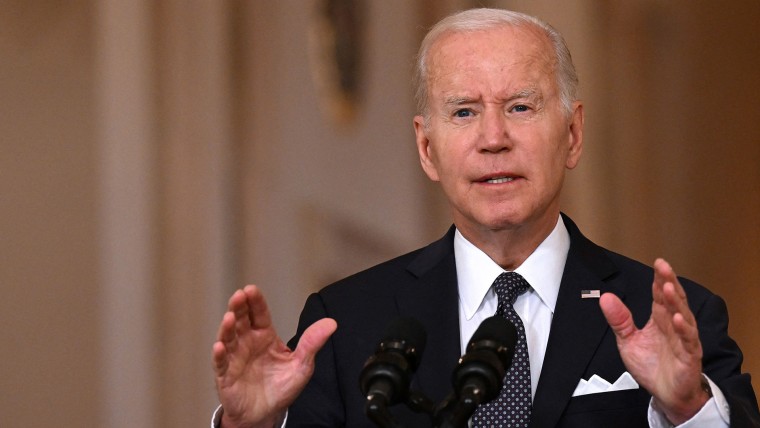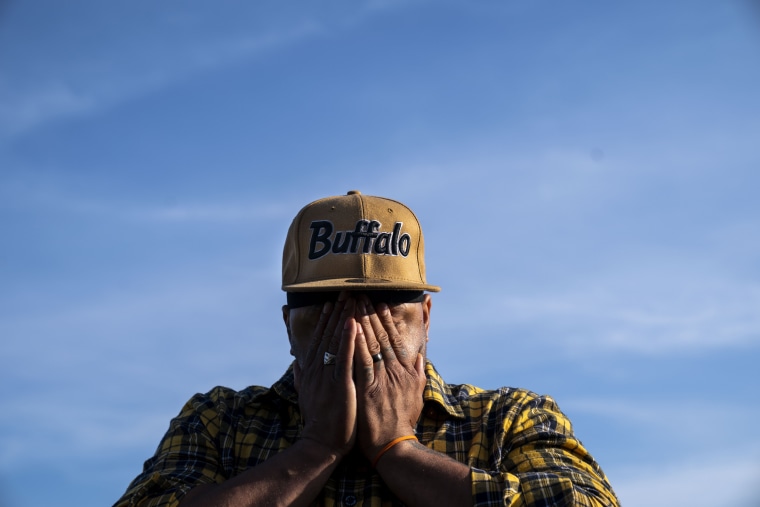
The House passed legislation on Friday that would ban assault weapons for the first time since 2004, in a sign that Democrats intend to pursue more aggressive gun violence prevention measures after a series of mass shootings.
The bill passed on a mostly party-line vote of 217 to 213, with two Republicans voting in favor of the measure and five Democrats voting against it.
The level of Republican opposition means the bill is unlikely to advance in the evenly divided Senate, where it would need the support of at least 10 Republicans to defeat a guaranteed filibuster. It’s also unclear whether the measure has the support of the Senate’s 50 Democrats.
The legislationwritten by Rep. David Cicilline, DR.I., would criminalize the knowing sale, manufacture, transfer, possession or importation of many types of semi-automatic weapons and high-capacity ammunition feeding devices.
During floor debate before Friday’s vote, House Democrats argued that assault weapons should be banned because of the number of recent shootings in which gunmen have used assault-style weapons.
“Our nation has watched in unspeakable horror as assault weapons have been used in massacre after massacre in communities across the country,” said House Speaker Nancy Pelosi. “We know an assault weapons ban can work because it has worked before.”
Rep. Jerry Nadler of New York, the chairman of the House Judiciary Committee, asked: “How many more mass shootings do we have to endure? When will we learn?”
The Judiciary Committee advanced the measure last week on a party line vote of 25 to 18.
House Republicans insisted Friday that the legislation was unconstitutional and that Democrats want to confiscate firearms.
“Today, they’re coming for your guns,” Rep. Jim Jordan of Ohio, the top Republican on the Judiciary Committee. “They want to take all the guns from all the people.”
This bill “I think will make communities less safe,” he added.
The assault weapons ban would not apply to some types of firearms, such as antiques, rifles and shotguns explicitly identified by make and model, and handguns that are manually operated in various ways.
Former President Bill Clinton enacted a 10-year assault weapons ban in 1994. It expired in 2004. Several studies, including one published in 2019 in the Journal of trauma surgery and acute carehave shown that deaths from mass shootings decreased during the years the ban was in effect.
Senate Republicans have not appeared open to any additional gun measures after passing bipartisan legislation last month aimed at improving background checks to include juvenile records and providing grants to states to enact “red flag” laws.
The five House Democrats who voted against the assault weapons ban were Reps. Henry Cuellar and Vicente Gonzalez of Texas, Kurt Schrader of Oregon, Jared Golden of Maine and Ron Kind of Wisconsin.
The two Republicans who crossed the aisle to support the bill were Reps. Chris Jacobs of New York and Brian Fitzpatrick of Pennsylvania. Jacobs’ district includes Buffalo, where a white gunman has been accused of killing 10 black people in a racist mass shooting at a supermarket in May.
 Curtis Hawkins covers his face with his hands near a memorial for the victims of a mass shooting at Tops Friendly Market on May 19, 2022 in Buffalo, New York Kent Nishimura / Los Angeles Times via Getty Images file
Curtis Hawkins covers his face with his hands near a memorial for the victims of a mass shooting at Tops Friendly Market on May 19, 2022 in Buffalo, New York Kent Nishimura / Los Angeles Times via Getty Images file
The cause for tougher gun laws has gained traction in Congress and in US opinion polls following the mass shootings in Buffalo and Uvalde, Texas. The push for gun limits also represents Democrats’ desire to turn the tables on the GOP on the crime issue heading into November’s midterm elections.
The House had planned to vote on the assault weapons ban earlier this week along with legislation to provide funding to local police departments. But members of the Congressional Black Caucus and other progressives opposed the latest measures, calling for more accountability measures in exchange for funding. They reached an agreement on Friday to move forward solely with the assault weapons ban.
Pelosi said the House will continue to work on police funding legislation for future consideration.
Rep. Joyce Beatty, who chairs the Congressional Black Caucus, told reporters she was proud of CBC’s leadership on Friday’s deal and grateful Pelosi listened to her concerns. He described the assault weapons vote as “the first step” in addressing violence and policing.
“We have people from Uvalde and Parkland who are here today with these kids, asking us to make sure we do an assault ban… Now, are we done? No, we’re not done. We’re going to go back and look at the railings that we’re posing,” he said, referring to the 2018 mass shooting at Marjory Stoneman Douglas High School in Parkland, Florida.
Friday’s vote comes days after the House Oversight Committee held a contentious hearing in which Democrats pressed gun manufacturers to take responsibility for their role in the gun violence epidemic and took a look at the which they called “disruptive sales tactics” to get young people to buy assault. weapons
Scott Wong, Ali Vitali and Kyle Stewart contributed.
[ad_2]
Source link





